SCEHO-IPSO: A Nature-Inspired Meta Heuristic Optimization for Task-Scheduling Policy in Cloud Computing
Abstract
:1. Introduction
- Proposed a SCEHO-IPSO algorithm to resolve task-scheduling problems in the cloud computing platforms. In this scenario, the scheduler effectively ranks user tasks based on execution time and memory details.
- Based on the capacity criteria, the SCEHO-IPSO algorithm determines the efficient VMs to execute tasks in the queue. The SCEHO-IPSO algorithm simultaneously enhances resource utilization and decreases the makespan value.
- The SCEHO-IPSO algorithm optimizes task scheduling by identifying the optimal solutions with better convergence rates. The effectiveness of the SCEHO-IPSO algorithm is analyzed by conducting different experiments. The performance measures cost, execution time, makespan, and latency, and memory storage demonstrates the efficacy of the SCEHO-IPSO algorithm over other optimization algorithms.
2. Literature Survey
3. Methodology
- Minimization of total cost: According to the user’s QoS parameters, the limited total monetary cost states that the SCEHO-IPSO algorithm is efficient.
- Maximization of the QoS parameters: The QoS parameters play a crucial role in cloud computing environments and are utilized to analyze the effectiveness of the SCEHO-IPSO algorithm. The higher QoS is superior, while other parameters remain unchanged.
- Workload balancing: Workload balancing is closely related to the resource utilization rate. If it is an excellent task-scheduling algorithm, the majority of resources should be fully used in cloud environments.
- Minimization of makespan: It represents that the proposed optimization algorithm completes the scheduling of tasks with limited execution time.
- Minimization of latency: Latency is an important measure for evaluating the proposed task-scheduling algorithm. The latency and response time should be limited if it is an excellent task-scheduling algorithm. The flow diagram of the proposed work is mentioned in Figure 1.
3.1. Resource Allocation to the VMs
3.2. Load Balancing in the VMs
3.3. Task Scheduling
3.4. SCEHO Algorithm
3.4.1. Process of Clan Updating
3.4.2. Process of Separation
3.5. IPSO Algorithm
| Algorithm 1. SCEHO-IPSO algorithm. |
| Step 1: Initialize the objective functions. Step 2: Create initial population. Step 3: Evaluate fitness value. Step 4: For every task, find the best local optimal solutions using SCEHO algorithm. Step 5: For every task, find the best global optimal solutions using IPSO algorithm. Step 6: Find the hybrid solutions. Step 7: If the hybrid new solution value is higher than the current value, then Step 8: replace the current value with the hybrid new solution. Step 9: Select any resources among the population. Step 10: If the execution time is higher for the selected resource, then eliminate the respective resource and select another resource. Step 11: Update personal best and global best solutions. Step 12: Retain it and rank the best solutions. Step 13: End. |
4. Simulation Results
4.1. Performance Measures
4.2. Quantitative Analysis
4.3. Discussion
5. Conclusions
Author Contributions
Funding
Institutional Review Board Statement
Informed Consent Statement
Data Availability Statement
Conflicts of Interest
Abbreviations
| ACO | Ant Colony Optimization |
| ALO | Ant Lion Optimization |
| ABC | Artificial Bee Colony |
| BW | Bandwidth |
| CPU | Computer Processing Unit |
| GA | Genetic Algorithm |
| GWO | Grey Wolf Optimization |
| HGO | Human Group Optimizer |
| IPSO | Improved Particle Swarm Optimization |
| MVO | Multi-Verse Optimization |
| QoS | Quality of Service |
| SCEHO | Sine Cosine based Elephant Herding Optimization |
| UBS | Utility Based Scheduler |
| VMs | Virtual Machines |
| Parameters | Definition |
| Computer processing unit of the physical machines | |
| Memory of the physical machines | |
| Bandwidth of the physical machines | |
| Computer processing unit of the VMs | |
| Memory of the VMs | |
| Bandwidth of the VMs | |
| Binary variable | |
| Task count | |
| Number of tasks | |
| Degree of load | |
| Maximum load in the host | |
| Minimum load in the host | |
| Finishing time of the task , | |
| Arrival time of the task , | |
| Dead-line of the task | |
| Execution time of the task . | |
| Completion time of the task | |
| Waiting time of the task | |
| Scaling factor | |
| Old positions of elephant in a clan | |
| New positions of elephant in a clan , | |
| Global or best fitted positions of a matriarch elephant in a clan | |
| Random numbers performs uniform distribution | |
| and | Lower and upper bounds of the elephant position |
| Worst elephants in a clan | |
| Acceleration coefficients | |
| Inertia weight used to balance local and global search | |
| and | Particles’ global best position and the personal best position |
| Nonlinear function | |
| Execution cost of the task on a resource | |
| Processing power of the VMs | |
| Task size | |
| Instances generated from the source code | |
| Number of instances per unit | |
| Total count of the workload |
References
- Jana, B.; Chakraborty, M.; Mandal, T. A task scheduling technique based on particle swarm optimization algorithm in cloud environment. In Soft Computing: Theories and Applications, Advances in Intelligent Systems and Computing; Ray, K., Sharma, T., Rawat, S., Saini, R., Bandyopadhyay, A., Eds.; Springer: Singapore, 2019; Volume 742, pp. 525–536. [Google Scholar] [CrossRef]
- Houssein, E.H.; Gad, A.G.; Wazery, Y.M.; Suganthan, P.N. Task scheduling in cloud computing based on meta-heuristics: Review, taxonomy, open challenges, and future trends. Swarm Evol. Comput. 2021, 62, 100841. [Google Scholar] [CrossRef]
- Arunarani, A.R.; Manjula, D.; Sugumaran, V. Task scheduling techniques in cloud computing: A literature survey. Future Gener. Comput. Syst. 2019, 91, 407–415. [Google Scholar] [CrossRef]
- Gupta, S.; Iyer, S.; Agarwal, G.; Manoharan, P.; Algarni, A.D.; Aldehim, G.; Raahemifar, K. Efficient Prioritization and Processor Selection Schemes for HEFT Algorithm: A Makespan Optimizer for Task Scheduling in Cloud Environment. Electronics 2022, 11, 2557. [Google Scholar] [CrossRef]
- Guo, X. Multi-objective task scheduling optimization in cloud computing based on fuzzy self-defense algorithm. Alex. Eng. J. 2021, 60, 5603–5609. [Google Scholar] [CrossRef]
- Ding, D.; Fan, X.; Zhao, Y.; Kang, K.; Yin, Q.; Zeng, J. Q-learning based dynamic task scheduling for energy-efficient cloud computing. Future Gener. Comput. Syst. 2020, 108, 361–371. [Google Scholar] [CrossRef]
- Hussain, M.; Wei, L.-F.; Lakhan, A.; Wali, S.; Ali, S.; Hussain, A. Energy and performance-efficient task scheduling in heterogeneous virtualized cloud computing. Sustain. Comput. Inform. Syst. 2021, 30, 100517. [Google Scholar] [CrossRef]
- Cai, X.; Geng, S.; Wu, D.; Cai, J.; Chen, J. A multicloud-model-based many-objective intelligent algorithm for efficient task scheduling in internet of things. IEEE Internet Things J. 2021, 8, 9645–9653. [Google Scholar] [CrossRef]
- Bezdan, T.; Zivkovic, M.; Tuba, E.; Strumberger, I.; Bacanin, N.; Tuba, M. Multi-objective Task Scheduling in Cloud Computing Environment by Hybridized Bat Algorithm. In Intelligent and Fuzzy Techniques: Smart and Innovative Solutions. INFUS 2020. Advances in Intelligent Systems and Computing; Kahraman, C., Cevik Onar, S., Oztaysi, B., Sari, I., Cebi, S., Tolga, A., Eds.; Springer: Cham, Switzerland, 2021; Volume 1197, pp. 718–725. [Google Scholar] [CrossRef]
- Yuan, H.; Bi, J.; Zhou, M.; Liu, Q.; Ammari, A.C. Biobjective task scheduling for distributed green data centers. IEEE Trans. Autom. Sci. Eng. 2021, 18, 731–742. [Google Scholar] [CrossRef]
- Zhou, J.; Sun, J.; Cong, P.; Liu, Z.; Zhou, X.; Wei, T.; Hu, S. Security-critical energy-aware task scheduling for heterogeneous real-time MPSoCs in IoT. IEEE Trans. Serv. Comput. 2020, 13, 745–758. [Google Scholar] [CrossRef]
- Wang, J.; Li, D. Task Scheduling Based on a Hybrid Heuristic Algorithm for Smart Production Line with Fog Computing. Sensors 2019, 19, 1023. [Google Scholar] [CrossRef]
- Boveiri, H.R.; Khayami, R.; Elhoseny, M.; Gunasekaran, M. An efficient Swarm-Intelligence approach for task scheduling in cloud-based internet of things applications. J. Ambient Intell. Hum. Comput. 2019, 10, 3469–3479. [Google Scholar] [CrossRef]
- Abualigah, L.; Diabat, A. A novel hybrid antlion optimization algorithm for multi-objective task scheduling problems in cloud computing environments. Clust. Comput. 2021, 24, 205–223. [Google Scholar] [CrossRef]
- Zhou, Z.; Li, F.; Zhu, H.; Xie, H.; Abawajy, J.H.; Chowdhury, M.U. An improved genetic algorithm using greedy strategy toward task scheduling optimization in cloud environments. Neural Comput. Appl. 2020, 32, 1531–1541. [Google Scholar] [CrossRef]
- Kumar, A.M.S.; Venkatesan, M. Multi-objective task scheduling using hybrid genetic-ant colony optimization algorithm in cloud environment. Wirel. Pers. Commun. 2019, 107, 1835–1848. [Google Scholar] [CrossRef]
- Mapetu, J.P.B.; Chen, Z.; Kong, L. Low-time complexity and low-cost binary particle swarm optimization algorithm for task scheduling and load balancing in cloud computing. Appl. Intell. 2019, 49, 3308–3330. [Google Scholar] [CrossRef]
- Natesan, G.; Chokkalingam, A. Task scheduling in heterogeneous cloud environment using mean grey wolf optimization algorithm. ICT Express 2019, 5, 110–114. [Google Scholar] [CrossRef]
- Shukri, S.E.; Al-Sayyed, R.; Hudaib, A.; Mirjalili, S. Enhanced multi-verse optimizer for task scheduling in cloud computing environments. Expert Syst. Appl. 2021, 168, 114230. [Google Scholar] [CrossRef]
- Velliangiri, S.; Karthikeyan, P.; Xavier, V.M.A.; Baswaraj, D. Hybrid electro search with genetic algorithm for task scheduling in cloud computing. Ain Shams Eng. J. 2021, 12, 631–639. [Google Scholar] [CrossRef]
- Jacob, T.P.; Pradeep, K. A multi-objective optimal task scheduling in cloud environment using cuckoo particle swarm optimization. Wirel. Pers. Commun. 2019, 109, 315–331. [Google Scholar] [CrossRef]
- Li, J.; Han, Y. A hybrid multi-objective artificial bee colony algorithm for flexible task scheduling problems in cloud computing system. Clust. Comput. 2020, 23, 2483–2499. [Google Scholar] [CrossRef]
- Alsaidy, S.A.; Abbood, A.D.; Sahib, M.A. Heuristic initialization of PSO task scheduling algorithm in cloud computing. J. King Saud Univ.-Comput. Inf. Sci. 2022, 34, 2370–2382. [Google Scholar] [CrossRef]
- Sanaj, M.S.; Prathap, P.M.J. Nature inspired chaotic squirrel search algorithm (CSSA) for multi objective task scheduling in an IAAS cloud computing atmosphere. Eng. Sci. Technol. Int. J. 2020, 23, 891–902. [Google Scholar] [CrossRef]
- Kumar, A.M.S.; Venkatesan, M. Task scheduling in a cloud computing environment using HGPSO algorithm. Clust. Comput. 2019, 22 (Suppl. 1), 2179–2185. [Google Scholar] [CrossRef]
- Pang, S.; Li, W.; He, H.; Shan, Z.; Wang, X. An EDA-GA hybrid algorithm for multi-objective task scheduling in cloud computing. IEEE Access 2019, 7, 146379–146389. [Google Scholar] [CrossRef]
- Elaziz, M.A.; Xiong, S.; Jayasena, K.P.N.; Li, L. Task scheduling in cloud computing based on hybrid moth search algorithm and differential evolution. Knowl.-Based Syst. 2019, 169, 39–52. [Google Scholar] [CrossRef]
- Li, G.; Wu, Z. Ant Colony Optimization Task Scheduling Algorithm for SWIM Based on Load Balancing. Future Internet 2019, 11, 90. [Google Scholar] [CrossRef]
- Hasan, M.Z.; Al-Rizzo, H.; Al-Turjman, F.; Rodriguez, J.; Radwan, A. Internet of Things Task Scheduling in Cloud Environment Using Particle Swarm Optimization. In Proceedings of the 2018 IEEE Global Communications Conference (GLOBECOM), Abu Dhabi, United Arab Emirates, 9–13 December 2018; IEEE: Piscataway, NJ, USA, 2018; pp. 1–6. [Google Scholar] [CrossRef]
- Mansouri, N.; Zade, B.M.H.; Javidi, M.M. Hybrid task scheduling strategy for cloud computing by modified particle swarm optimization and fuzzy theory. Comput. Ind. Eng. 2019, 130, 597–633. [Google Scholar] [CrossRef]
- Chandrashekar, C.; Krishnadoss, P.; Kedalu Poornachary, V.; Ananthakrishnan, B.; Rangasamy, K. HWACOA Scheduler: Hybrid Weighted Ant Colony Optimization Algorithm for Task Scheduling in Cloud Computing. Appl. Sci. 2023, 13, 3433. [Google Scholar] [CrossRef]
- Li, J.; Lei, H.; Alavi, A.H.; Wang, G.-G. Elephant Herding Optimization: Variants, Hybrids, and Applications. Mathematics 2020, 8, 1415. [Google Scholar] [CrossRef]
- Li, W.; Wang, G.-G.; Alavi, A.H. Learning-based elephant herding optimization algorithm for solving numerical optimization problems. Knowl.-Based Syst. 2020, 195, 105675. [Google Scholar] [CrossRef]
- Li, W.; Wang, G.-G. Elephant herding optimization using dynamic topology and biogeography-based optimization based on learning for numerical optimization. Eng. Comput. 2022, 38 (Suppl. 2), 1585–1613. [Google Scholar] [CrossRef]
- Strumberger, I.; Minovic, M.; Tuba, M.; Bacanin, N. Performance of Elephant Herding Optimization and Tree Growth Algorithm Adapted for Node Localization in Wireless Sensor Networks. Sensors 2019, 19, 2515. [Google Scholar] [CrossRef] [PubMed]
- Elhosseini, M.A.; El Sehiemy, R.A.; Rashwan, Y.I.; Gao, X.Z. On the performance improvement of elephant herding optimization algorithm. Knowl.-Based Syst. 2019, 166, 58–70. [Google Scholar] [CrossRef]
- Wang, X.; Yao, W. A Discrete Particle Swarm Optimization Algorithm for Dynamic Scheduling of Transmission Tasks. Appl. Sci. 2023, 13, 4353. [Google Scholar] [CrossRef]
- Pradhan, A.; Bisoy, S.K.; Das, A. A survey on PSO based meta-heuristic scheduling mechanism in cloud computing environment. J. King Saud Univ.-Comput. Inf. Sci. 2022, 34, 4888–4901. [Google Scholar] [CrossRef]
- Ramírez-Ochoa, D.-D.; Pérez-Domínguez, L.A.; Martínez-Gómez, E.-A.; Luviano-Cruz, D. PSO, a Swarm Intelligence-Based Evolutionary Algorithm as a Decision-Making Strategy: A Review. Symmetry 2022, 14, 455. [Google Scholar] [CrossRef]
- Jiang, H.; He, Z.; Ye, G.; Zhang, H. Network intrusion detection based on PSO-XGBoost model. IEEE Access 2020, 8, 58392–58401. [Google Scholar] [CrossRef]
- Deng, W.; Xu, J.; Zhao, H.; Song, Y. A novel gate resource allocation method using improved PSO-based QEA. IEEE Trans. Intell. Transp. Syst. 2022, 23, 1737–1745. [Google Scholar] [CrossRef]
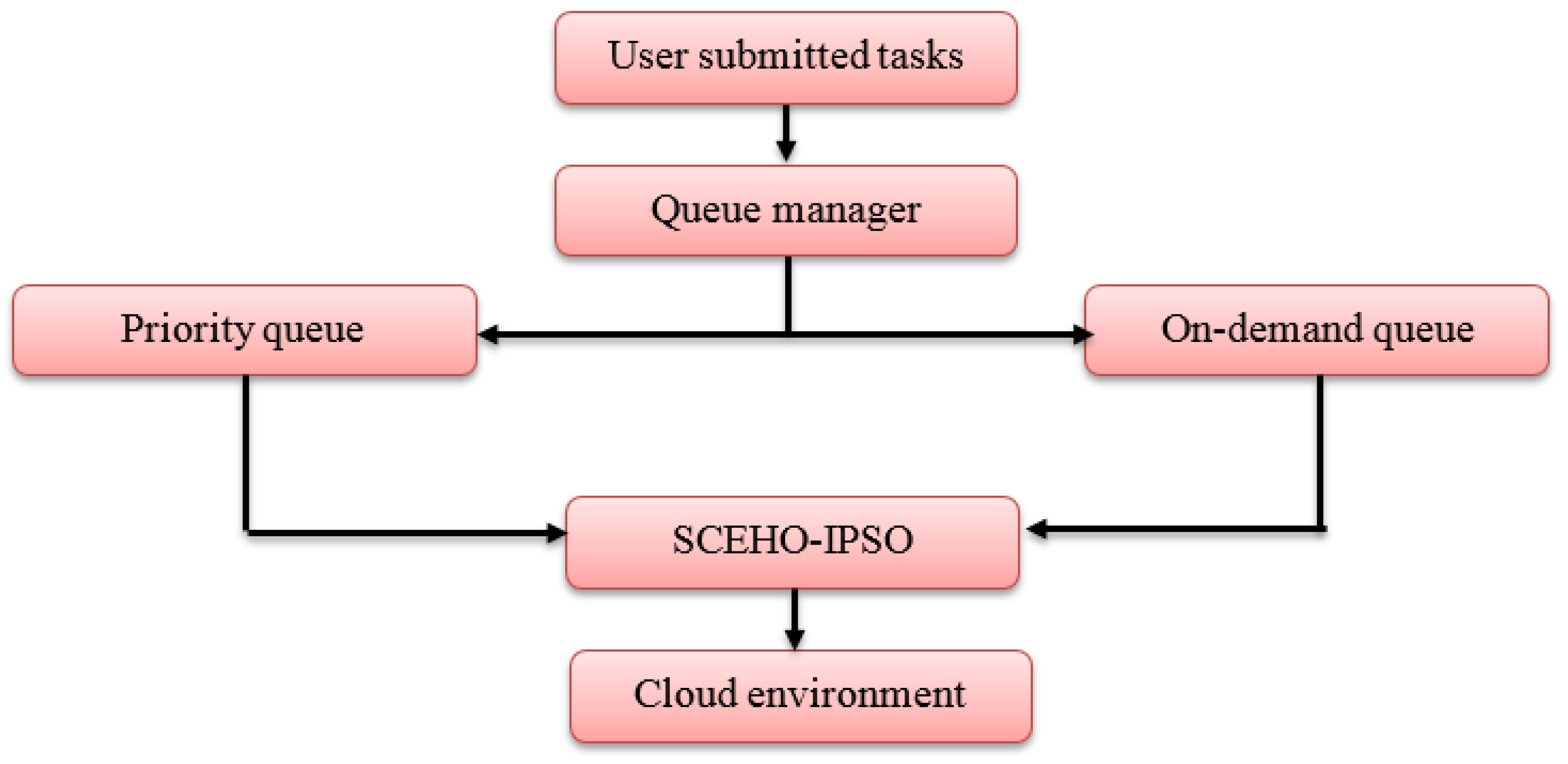

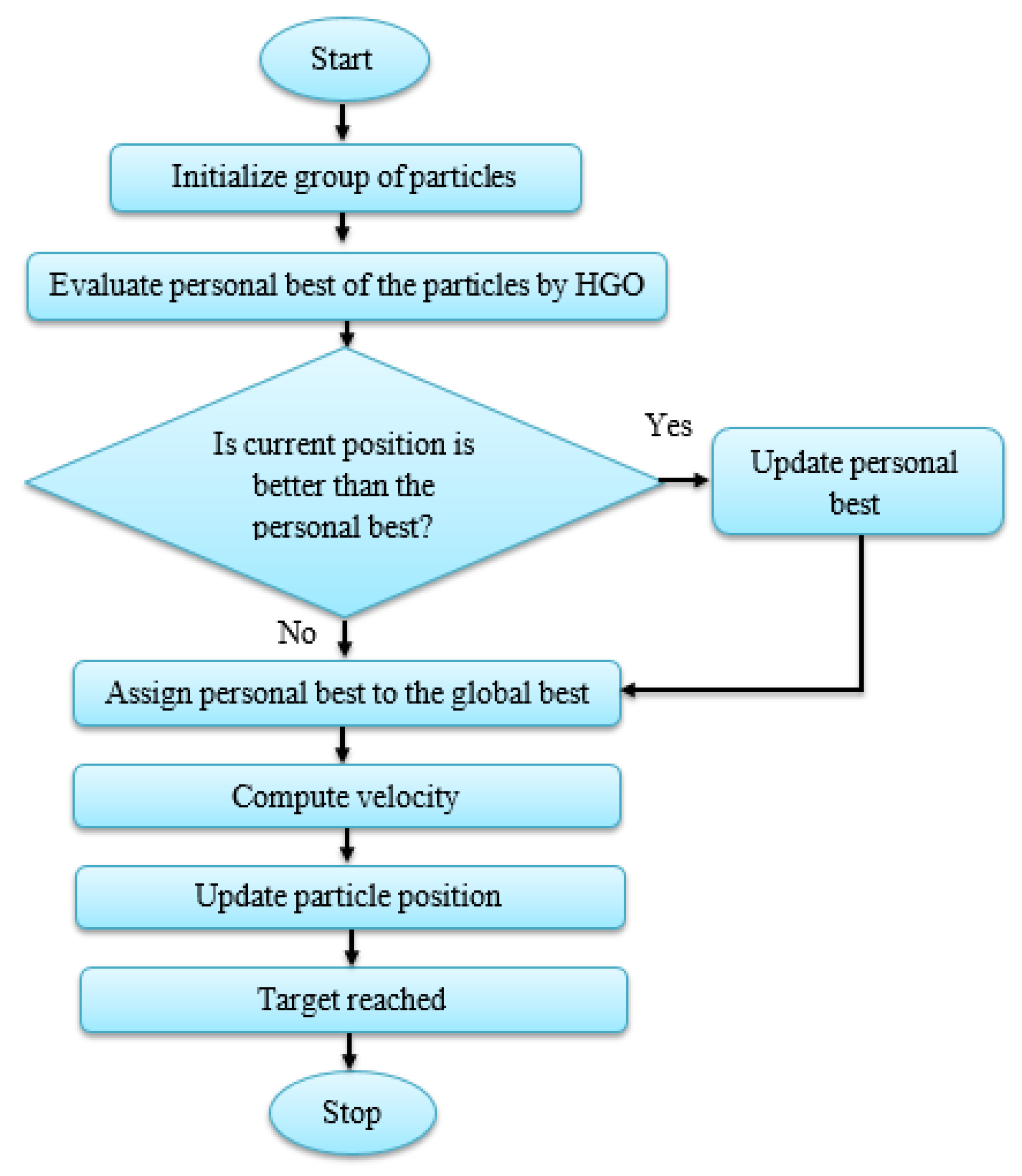
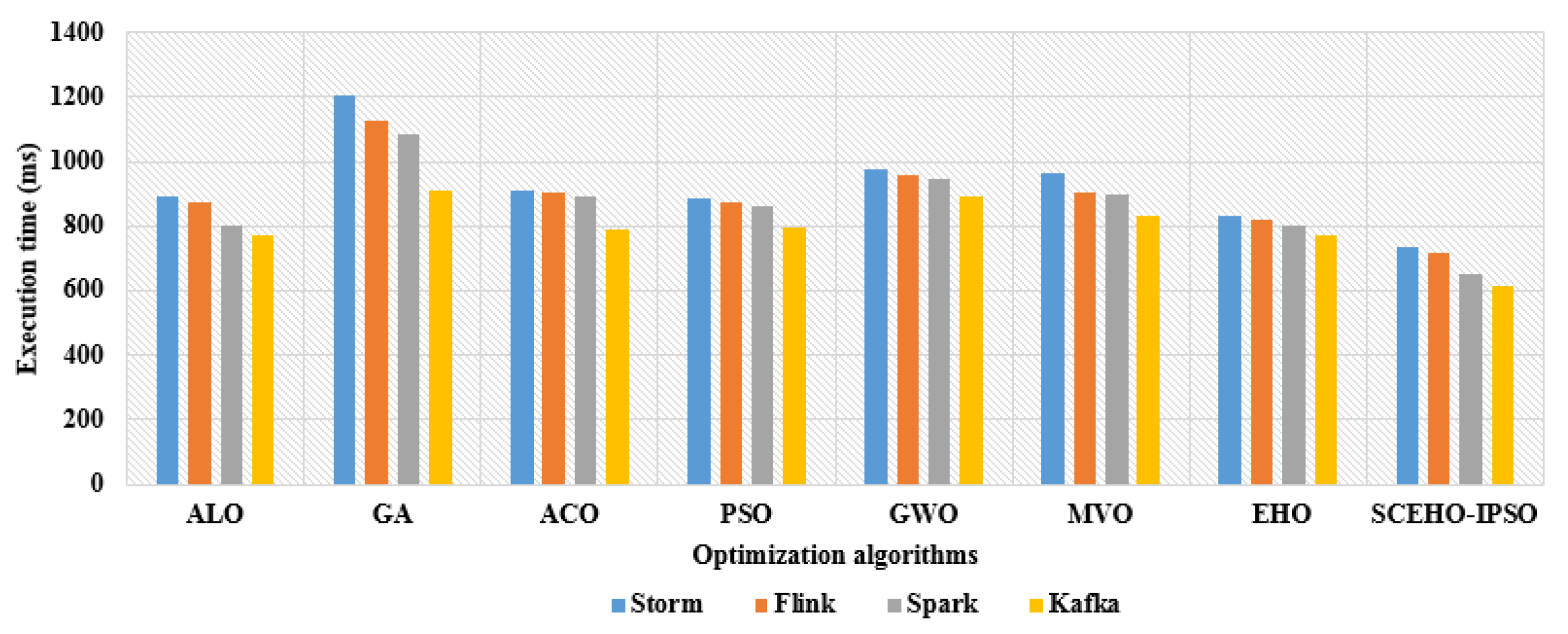
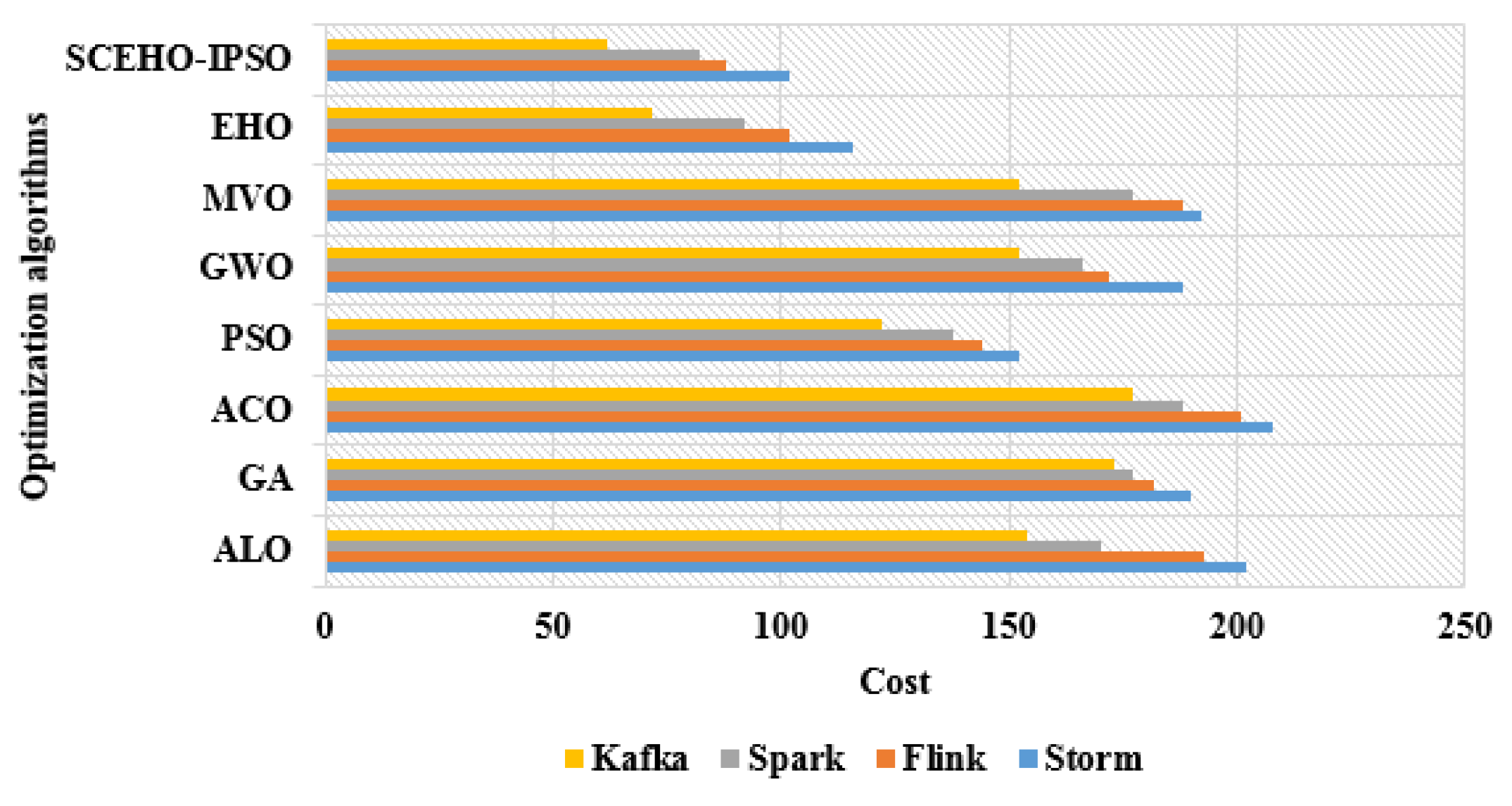
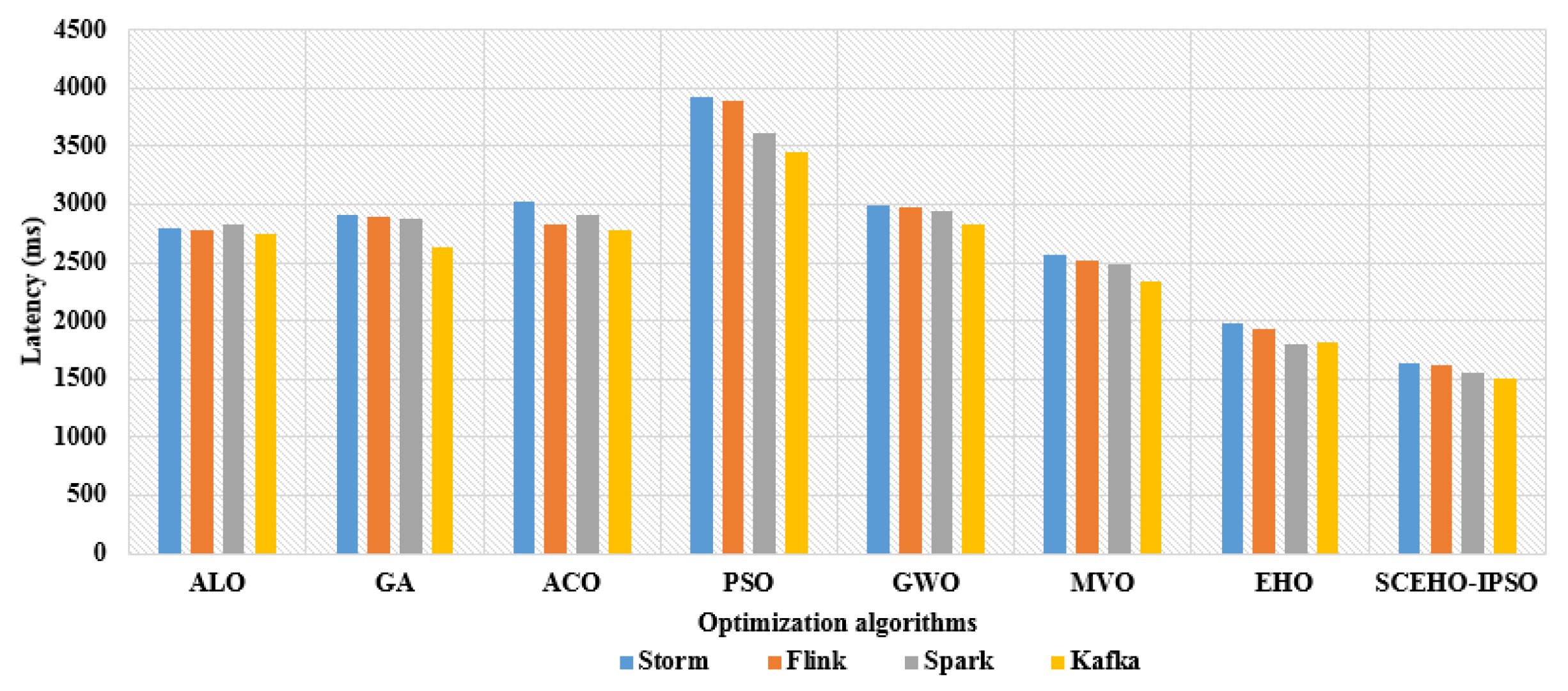
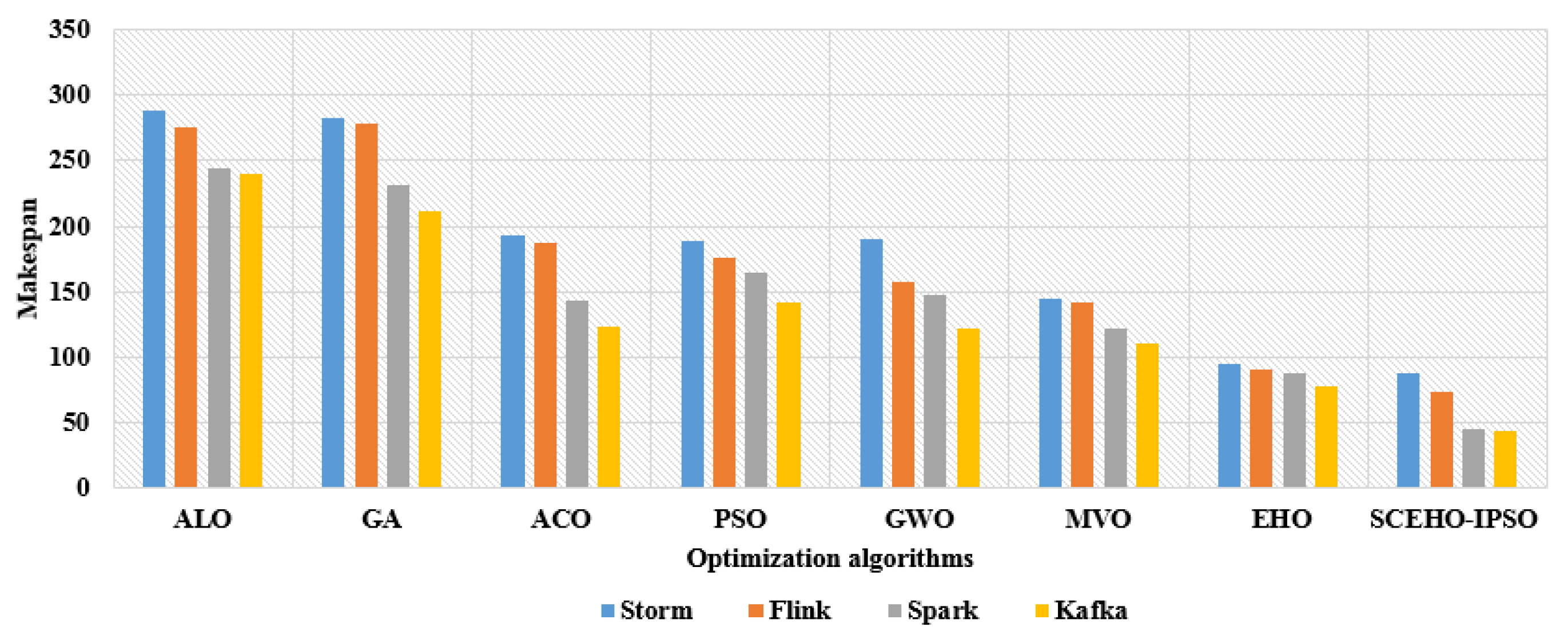
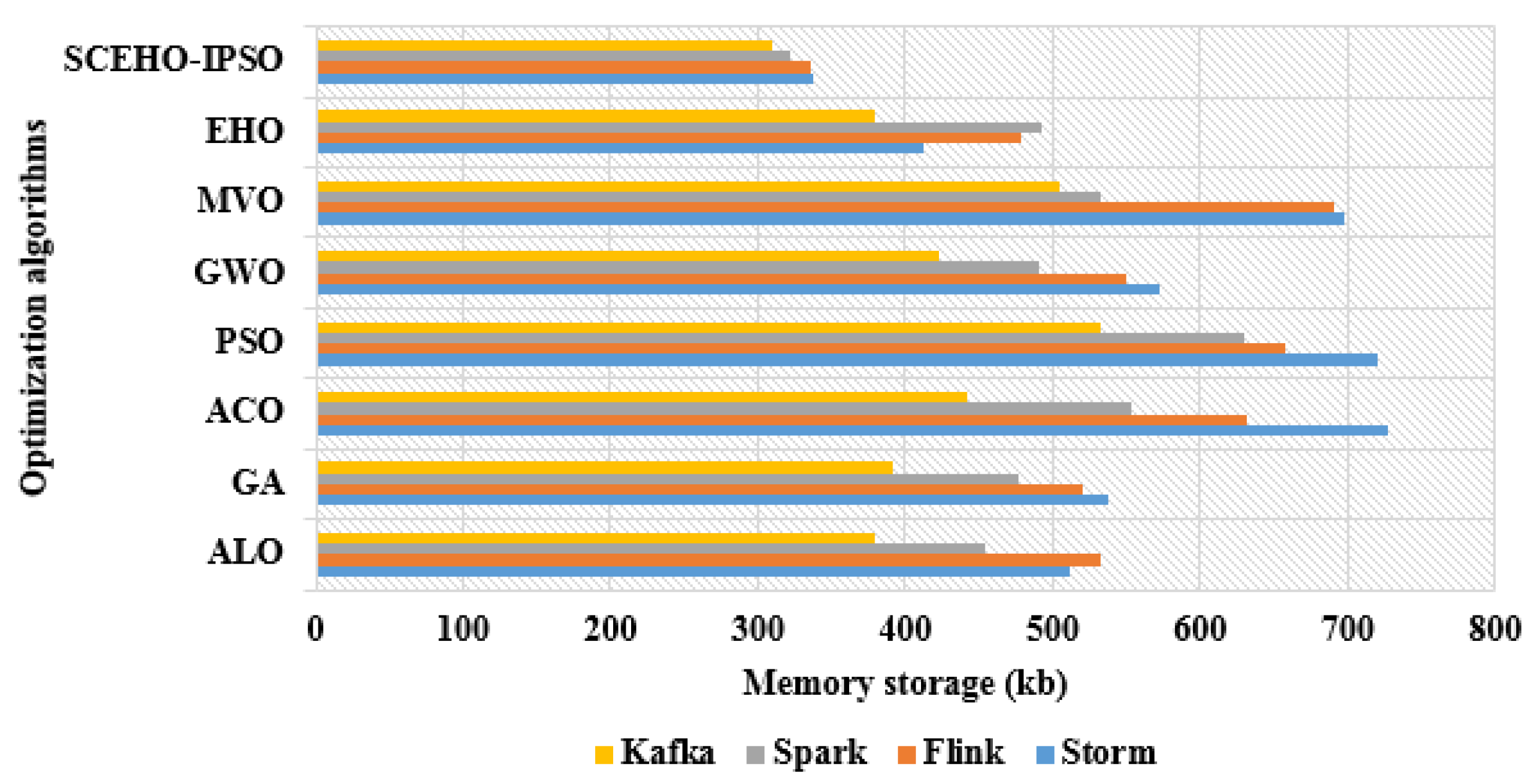
| Datacenter | |
|---|---|
| Number of hosts | 2 |
| Number of datacenters | 10 |
| VMs | |
| Number of processing elements | 2 |
| Bandwidth | 500 |
| Million instructions per seconds | 500 |
| Number of VMs | 1000 |
| Number of service providers | 5 |
| Task (cloud-let) | |
| Number of tasks | 1000 |
| Task length | 1000 |
| Execution Time (ms) | ||||||||
|---|---|---|---|---|---|---|---|---|
| Platform | ALO | GA | ACO | PSO | GWO | MVO | EHO | SCEHO-IPSO |
| Storm | 894 | 1203 | 910 | 887 | 978 | 963 | 834 | 733 |
| Flink | 873 | 1129 | 905 | 876 | 956 | 904 | 820 | 720 |
| Spark | 802 | 1082 | 890 | 864 | 944 | 896 | 802 | 652 |
| Kafka | 772 | 910 | 787 | 793 | 892 | 834 | 772 | 612 |
| Cost | ||||||||
| Platform | ALO | GA | ACO | PSO | GWO | MVO | EHO | SCEHO-IPSO |
| Storm | 202 | 190 | 208 | 152 | 188 | 192 | 116 | 102 |
| Flink | 193 | 182 | 201 | 144 | 172 | 188 | 102 | 88 |
| Spark | 170 | 177 | 188 | 138 | 166 | 177 | 92 | 82 |
| Kafka | 154 | 173 | 177 | 122 | 152 | 152 | 72 | 62 |
| Latency (ms) | ||||||||
|---|---|---|---|---|---|---|---|---|
| Platform | ALO | GA | ACO | PSO | GWO | MVO | EHO | SCEHO-IPSO |
| Storm | 2800 | 2914 | 3018 | 3920 | 2990 | 2560 | 1982 | 1630 |
| Flink | 2773 | 2888 | 2822 | 3892 | 2967 | 2521 | 1928 | 1626 |
| Spark | 2822 | 2880 | 2902 | 3620 | 2940 | 2490 | 1802 | 1550 |
| Kafka | 2754 | 2635 | 2772 | 3450 | 2829 | 2339 | 1820 | 1510 |
| Makespan | ||||||||
|---|---|---|---|---|---|---|---|---|
| Platform | ALO | GA | ACO | PSO | GWO | MVO | EHO | SCEHO-IPSO |
| Storm | 288 | 283 | 193 | 188 | 190 | 144 | 94 | 88 |
| Flink | 276 | 279 | 187 | 176 | 158 | 142 | 90 | 73 |
| Spark | 244 | 232 | 143 | 165 | 148 | 122 | 88 | 45 |
| Kafka | 240 | 212 | 123 | 142 | 122 | 110 | 78 | 44 |
| Memory storage (kb) | ||||||||
| Platform | ALO | GA | ACO | PSO | GWO | MVO | EHO | SCEHO-IPSO |
| Storm | 512 | 538 | 727 | 721 | 573 | 698 | 413 | 338 |
| Flink | 532 | 521 | 632 | 658 | 549 | 690 | 479 | 336 |
| Spark | 454 | 477 | 553 | 630 | 490 | 532 | 493 | 322 |
| Kafka | 380 | 392 | 442 | 532 | 422 | 504 | 379 | 309 |
Disclaimer/Publisher’s Note: The statements, opinions and data contained in all publications are solely those of the individual author(s) and contributor(s) and not of MDPI and/or the editor(s). MDPI and/or the editor(s) disclaim responsibility for any injury to people or property resulting from any ideas, methods, instructions or products referred to in the content. |
© 2023 by the authors. Licensee MDPI, Basel, Switzerland. This article is an open access article distributed under the terms and conditions of the Creative Commons Attribution (CC BY) license (https://creativecommons.org/licenses/by/4.0/).
Share and Cite
Rajashekar, K.J.; Channakrishnaraju; Gowda, P.C.; Jayachandra, A.B. SCEHO-IPSO: A Nature-Inspired Meta Heuristic Optimization for Task-Scheduling Policy in Cloud Computing. Appl. Sci. 2023, 13, 10850. https://doi.org/10.3390/app131910850
Rajashekar KJ, Channakrishnaraju, Gowda PC, Jayachandra AB. SCEHO-IPSO: A Nature-Inspired Meta Heuristic Optimization for Task-Scheduling Policy in Cloud Computing. Applied Sciences. 2023; 13(19):10850. https://doi.org/10.3390/app131910850
Chicago/Turabian StyleRajashekar, Kaidala Jayaram, Channakrishnaraju, Puttamadappa Chaluve Gowda, and Ananda Babu Jayachandra. 2023. "SCEHO-IPSO: A Nature-Inspired Meta Heuristic Optimization for Task-Scheduling Policy in Cloud Computing" Applied Sciences 13, no. 19: 10850. https://doi.org/10.3390/app131910850
APA StyleRajashekar, K. J., Channakrishnaraju, Gowda, P. C., & Jayachandra, A. B. (2023). SCEHO-IPSO: A Nature-Inspired Meta Heuristic Optimization for Task-Scheduling Policy in Cloud Computing. Applied Sciences, 13(19), 10850. https://doi.org/10.3390/app131910850






